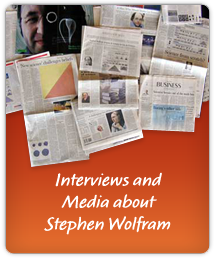Contribution to Philosophy of Computing and Information: 5 Questions
Philosophy of Computing and Information: 5 Questions, 1 July 2008, Automatic Press / VIP, ch. 17, pp. 177-180, “Stephen Wolfram,” Luciano Floridi, ed.
1. Why were you initially drawn to computational and/or informational issues?
At first, it was a very practical thing. I always believe in using the best tools. And in the early 1970s (when I was an early teenager), I happened to get interested in physics. And I realized that the best way to figure out some things I wanted to figure out in physics was to use a computer. So I learned how to do that.
In the years that followed I became pretty good at using computers in practice to figure things out. And then at the beginning of the 1980s I decided to start building better tools for the kind of computing I wanted to do. And I realized that to do that I needed to understand more about the foundations of computation.
When I went on doing science, I then realized that I could apply what I’d learned about the foundations of computation. And the result was that I developed a new approach to science that’s very fundamentally based on computational ideas.
2. What example(s) from your work (or the work of others) best illustrates the fruitful use of a computational and/or informational approach for foundational researches and/or applications?
I’ve now spent about twenty-five years applying computational ideas to questions in basic science. The single most fruitful concept has been exploring the computational universe of possible programs.
The exact sciences have always tended to use a fairly small set of models, mostly based on traditional mathematics. A key new concept from computation is to enumerate all possible programs—and potentially use them as models.
Studying the universe of possible simple programs defines a new kind of basic science. And what I’ve found is that that new kind of basic science is not only rich and fascinating in its own right—but is also immediately applicable. For what I’ve discovered is that in the universe of simple programs there are ones immediately relevant for understanding the natural world, for creating technology, and for creating all sorts of new forms and artefacts.
Learning about the computational universe also informs many old foundational questions in science and elsewhere. It shows us at a basic level why complexity is so easy for nature to produce, and so widespread. It shows us that there are fundamental computational limitations to traditional mathematical science. It gives us insight into how similar phenomena like intelligence are to natural processes. It shows us how special—and in many ways arbitrary—the formal systems like mathematics that we have built are.
3. What is the proper role of computer science and/or information science in relation to other disciplines?
Every discipline will inevitably become “computational”—and its methods and practice will become deeply infused with computation. I happen to have seen this personally over the past two decades as Mathematica and the computational capabilities it brings have spread through more and more fields.
Computation is crucial both to doing better what has been done before in other disciplines, and in defining fundamentally new approaches. In the past, mathematics and physics were the primary formal systems from which we took methods and language for other disciplines. Computation provides us a new—and very rich—underlying framework.
4. What do you consider the most neglected topics and/or contributions in late 20th century studies of computation and/or information?
Computer and information science have tended to define themselves in a rather engineering-based way—concentrating on creating and studying systems that perform particular specified tasks.
But there’s a whole different approach that’s much closer to natural science: to just investigate the computational universe of possible programs, and see what’s out there.
One might have thought that most programs that one would encounter this way would not do anything very interesting. But the discovery that launched what I’ve done for the past quarter century is that that’s not the case. Even remarkably simple programs—that one would quickly encounter in sampling programs from the computational universe—can show immensely rich and complex behavior.
There’s a whole new kind of science that can be done by studying those programs.
5. What are the most important open problems concerning computation and/or information and what are the prospects for progress?
There’s a lot still to discover about the computational universe. It’s like many past explorations—whether of the flora and fauna of the earth, of the chemicals that can be created, or of the diversity of astronomical objects. We’ve learned enough to be able to do some basic classification, and we’ve been able to guess at some general principles. But there’s a huge amount of detailed science to do in studying the computational universe.
There are a lot of important things that we might find in the computational universe. Perhaps we’ll find an ultimate model for the physics of our actual, physical, universe. Perhaps we’ll find the keys to many longstanding mysteries in science. Of one thing I am certain: in the computational universe there is a huge amount that we can mine for human purposes—for creating technology, or art, or other things that we as humans use.
For millennia, we have mined the natural world for objects and materials that we can use. But when it comes to procedures, forms, or algorithms, we have tended to create them incrementally using traditional engineering methods. The computational universe provides a fantastically new rich source.
I and others have already created a growing body of technology derived from “mining” the computational universe. And this process will surely accelerate—so that in a few decades I expect that there will be more new technology obtained by mining the computational universe than by all traditional methods put together.
